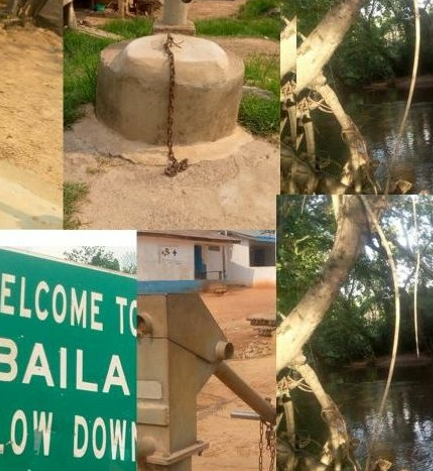Leaving The Community To Rely On Creek And Well Water
PHOTO: The creek where some residents of Baila are constrained to fetch drinking water from
By Susannah Reeds with FeJAL
BAILA, BONG COUNTY, Liberia – It’s been nearly a year since three out of the five hand pumps in the town became completely unusable. Residents informed this reporter that even the two remaining pumps are nearly ineffective.
The scarcity of safe drinking water has forced villagers to resort to fetching water from nearby creeks and wells for their daily chores and drinking, thereby exposing approximately two thousand residents in the area to serious health risks.
The town’s leaders, David B. Gbarnga and Gormah Sapoluseah, verified that in 2023 and earlier this year, several children experienced diarrhea due to the consumption of creek and well water. They reported that despite numerous attempts by the town to seek assistance from local or international organizations to replace their damaged hand pumps, no progress has been made.

“We are dying slowly,” said Annie Seasay. “There was a time when all the children were toileting with slippery liquid and some people were asking me to make them country medicine.”
Some days when the two hand pumps, fortunately, happen to pour out small water since it works “off and on”, residents say it results in a long waiting queue, especially during peak hours, causing inconvenience and potential conflicts among community members. School-going children at this point get late for school.
“The population is higher than the number of pumps here,” says David Gbanda. “Sometimes when they draw it, it can run dry so the children can be looking for drinking water to use and to drink and they rather go to the creek, which is not safe.”
As the rainy season sets in, Baila residents are even worried as children continue to suffer from diarrhea and other water-borne diseases that if nothing is done replace their damage hand pumps the water situation may worsen.
“The only way we can get water is that we can go near the swamp and dig wells there and that’s the only way we can get water to drink. It is not save, but we don’t have any different water, so what will we do? Chairlady, Annie Seasay told this paper.
According to a UNICEF 2017 report, less than 10 percent of Liberians have access to safe drinking water and sanitation services, despite Liberia’s abundant water resources.
The report elaborates that nearly ninety percent of Liberians lack adequate access to safe drinking water. Baila exemplifies just one of numerous rural communities grappling with these challenges.
As the rainy season begins, health authorities caution that the situation may deteriorate further, as heavy rainfall can exacerbate water source contamination in the region, posing a life-threatening scenario.
“People are defecating at the top of the water while others are down strain drinking it. It is dangerous and not healthy and it poses much danger to the children.” Richard Diggs, a laboratory technician at a local clinic, the Wet Land Clinic in Bong County said.
The Wet Land Clinic is the only health facility in the area. However, the clinic is often challenged with insufficient medicine to address the health challenges in the area despite being helpful to the community during several health incidents.
Briggs advises Bailai residents to ensure they boil water from creeks and wells extensively before consumption, prioritizing the safety and health of the community, particularly children.
“The health facility is not much equipped to that level where we have all of the drugs here,” Briggs said. He added, “At times we will have some drugs, but it cannot cater to all of the cases, so my advice to the community is to boil the water well before drinking it.”
According to a 2017 report by the Joint Monitoring Programme cited by WaterAid Liberia, sanitation conditions are dire, particularly in rural areas, where the majority of people lack proper toilets and latrines, resorting to open defecation instead. Approximately 42 percent of Liberia’s population practices open defecation, the report highlights.
This Diggs and other health experts say is dangerous to open water sources like Baila’s current safe drinking water challenges.
Baila residents are anxiously seeking assistance for their water crisis, yet the source and timeline of aid remain uncertain. Consequently, they are appealing to the Government of Liberia to intervene and either build new hand pumps or refurbish existing ones, restoring access to safe and clean water for the community. This story is produced by FeJAL Mentorship Fellow, through the support of Internews USAID, Year III Media Activity Reporting Program.

